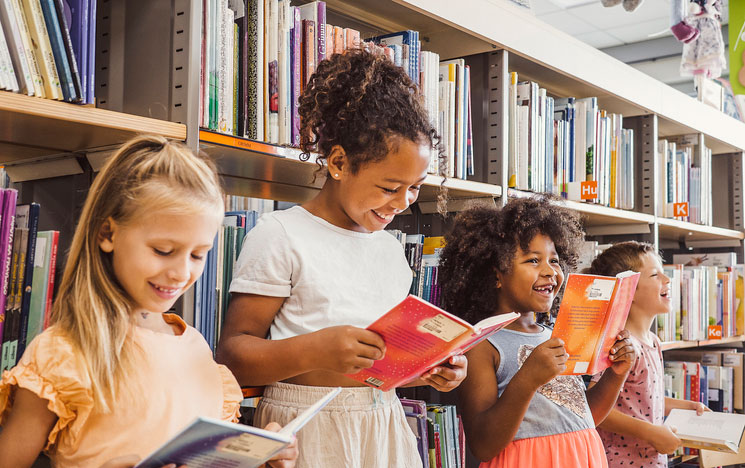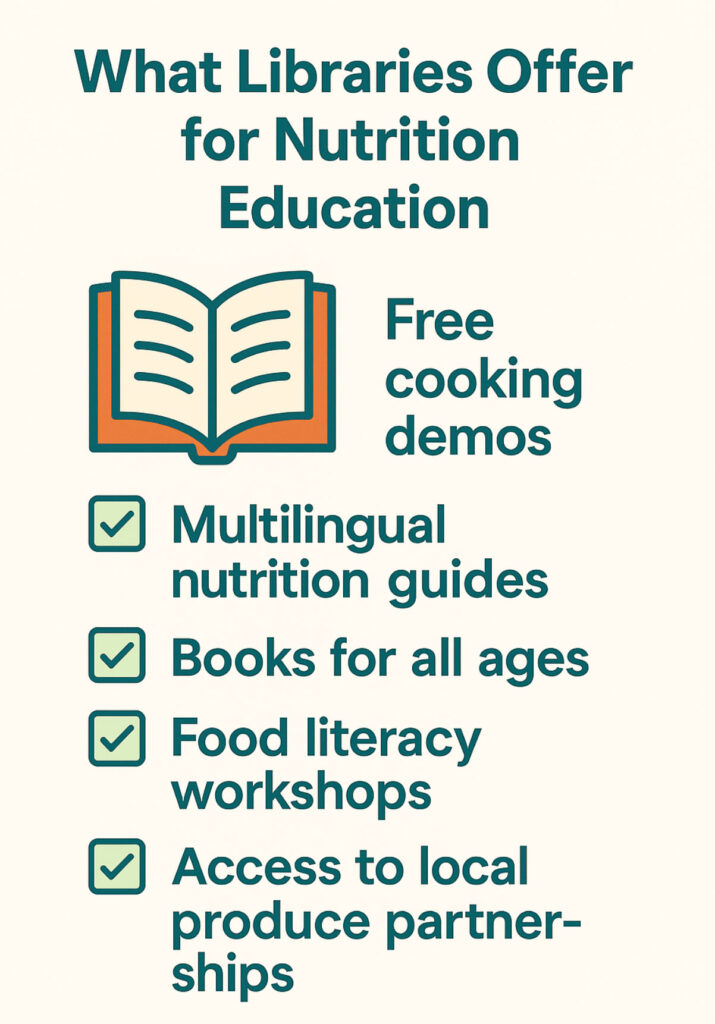
Libraries are trusted, welcoming spaces that bring communities together to learn, grow, and thrive. In recent years, libraries have expanded their role beyond books to become active partners in promoting health and wellness—including nutrition education for people of all ages. From toddlers to seniors, libraries offer inclusive programs and resources that help individuals and families build healthier habits through accessible, engaging learning experiences.
“Did you know that over 90% of public libraries now offer health-related programming? In an age of rising diet-related diseases, libraries are stepping up—not just as places to read, but as hubs for lifelong wellness.”
John Doe
Why Libraries Matter in Public Health
- The rise in food insecurity and chronic disease
Libraries’ role in reaching underserved populations
Trust in librarians as community educators
For Children and Families
Libraries make learning about healthy eating fun and approachable for children. Nutrition-themed storytimes often feature books about fruits and vegetables, food groups, or cooking adventures, followed by interactive activities like food-themed crafts, healthy snack prep, or garden exploration. These experiences support not only nutrition literacy but also early childhood development and family bonding.
For Teens and Young Adults
Teens benefit from programs that encourage independence and real-world skills. Libraries may offer cooking workshops where young people learn to prepare easy, budget-friendly meals, read nutrition labels, and understand the basics of balanced eating. These practical skills are especially valuable for those transitioning to college or managing their own diets for the first time.
For Adults and Seniors
Adult programming often includes sessions on chronic disease prevention, meal planning, label reading, and cooking demonstrations. Some libraries partner with registered dietitians, health departments, or cooperative extension services to host classes focused on heart health, diabetes-friendly diets, or cultural approaches to nutrition. Senior-specific events might include healthy aging workshops or tastings that support nutrient needs later in life.
Nutrition Resources Available in Libraries:
- Children’s books and cookbooks that teach healthy eating through stories and simple recipes
Teen and adult cookbooks focused on affordable, nutritious meals
Health and wellness displays for all ages with seasonal or themed nutrition tips
Interactive games and puzzles for kids to learn food group basics and healthy habits
Digital platforms with courses, videos, or ebooks on cooking, meal planning, and wellness
Handouts and brochures with practical guidance on label reading, portion sizes, or grocery budgeting
Workshops and classes led by dietitians, chefs, or health educators
Community partnerships that provide cooking demos, gardening projects, or access to fresh foods

As free and open spaces, libraries are uniquely positioned to reach people who may face barriers to traditional health education. Whether it’s a family attending a cooking class together, a teen learning to cook their first meal, or a senior exploring ways to eat better on a fixed income, the library provides support in a trusted, nonjudgmental environment.
In short, libraries empower individuals and families of all ages to take charge of their health. By providing nutrition education through books, programs, and community connections, libraries help build stronger, healthier communities—one meal and one learner at a time.
“Check your local library’s calendar—you might be surprised to find nutrition story hours, meal-prep classes, or even free grocery kits waiting for you.”
John Doe
Additional Resources for Nutrition Education in Libraries
For Librarians and Educators:
National Network of Libraries of Medicine (NNLM) – Health Programming Toolkit
Offers a guide for libraries looking to implement health and nutrition programs, including vetted materials, activities, and training.
Let’s Move! Libraries
A project that supports physical activity and nutrition programs in libraries, with case studies and planning tools.
USDA Team Nutrition – Library Resources
https://www.fns.usda.gov/tn/library-resources
Free educational materials that libraries can use for youth nutrition programming, including handouts, posters, and booklists.
For Families and Individuals:
MyPlate.gov
Government site with nutrition tips, videos, and meal planning tools for all age groups—great for linking on digital kiosks or flyers.
EatRight.org (Academy of Nutrition and Dietetics)
A trusted hub for science-based nutrition articles, recipes, and downloadable resources.
KidsGardening.org – Garden-Based Nutrition Activities
Offers free gardening and food literacy activities that libraries can integrate into family and youth programs.
